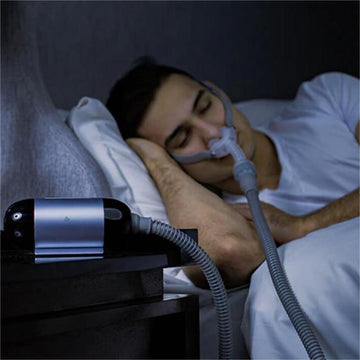Sleep apnea is a common sleep disorder that affects millions of people around the world. While Continuous Positive Airway Pressure (CPAP) therapy is an effective treatment for sleep apnea, it can be challenging for people who travel frequently. Thankfully, advances in technology have led to the development of portable CPAP machines that make it easier to continue therapy on the go. In this article, we'll explore everything you need to know about travel CPAP machines, including how they work, their features, and the best options available on the market.

What is a Travel CPAP Machine?
A travel CPAP machine is a portable device that delivers pressurized air to treat sleep apnea, just like a standard CPAP machine. However, travel CPAPs are designed to be lightweight, compact, and easy to transport. They come with smaller-sized humidifiers, water chambers, and masks that fit comfortably and are suitable for different sleeping positions.
How Does a Travel CPAP Machine Work?
A travel CPAP machine works by using a small motor to draw in air from the surrounding environment and pressurizing it to the level prescribed by your doctor. The pressurized air is then delivered through a hose and a mask worn over the nose or mouth, keeping the airway open and preventing apnea events. Some travel CPAP machines also include a built-in humidifier to add moisture to the air, making it more comfortable to breathe.
Features to Consider When Choosing a Travel CPAP Machine
When choosing a travel CPAP machine, there are several features to consider, including:
Size and WeightTravel CPAP machines come in different sizes and weights, with some being as small as a soda can. The smaller and lighter the machine, the easier it is to carry around while traveling.
Battery LifeBattery life is another important consideration when choosing a travel CPAP machine. Look for a machine with a long battery life, especially if you'll be away from an electrical outlet for an extended period. Some machines also come with a rechargeable battery or a battery pack.
Noise LevelThe noise level of a travel CPAP machine is another crucial factor, especially if you're a light sleeper or sharing a room with others. Look for a machine with a low decibel rating to minimize disturbances.
HumidifierSome travel CPAP machines come with a built-in humidifier to add moisture to the air, making it more comfortable to breathe. Consider if you need this feature and how easy it is to refill and clean the humidifier.
Mask CompatibilityEnsure that the travel CPAP machine is compatible with your preferred mask. Some machines are compatible with a wide range of masks, while others require specific masks to be used.
When Using Travel CPAP Machine, What's Needed to Be Paid Attention?
1. Choosing the Right Travel CPAP MachineWhen it comes to travel CPAP machines, there are several different types to choose from. Some are small and lightweight, while others are larger and more feature-rich. When choosing a travel CPAP machine, consider factors such as its size, weight, battery life, and noise level. You'll want a machine that's easy to transport, has a long-lasting battery, and won't disturb your sleep or that of your traveling companions.
2. Checking Airline Regulations
If you're traveling by plane, it's essential to check the airline's regulations regarding CPAP machines. Most airlines allow passengers to bring their CPAP machines on board as carry-on baggage, but there may be specific requirements or restrictions. For example, some airlines require that you notify them in advance that you'll be traveling with a CPAP machine. Additionally, you may need to bring a letter from your doctor stating that you require the use of a CPAP machine.
3. Preparing Your CPAP Machine for Travel
Before you embark on your trip, it's crucial to prepare your CPAP machine for travel. This includes ensuring that it's clean and functioning correctly, and that you have all the necessary components, such as masks, tubing, and filters. You'll also need to pack your machine securely to prevent damage during transit. Consider investing in a specialized travel bag designed to protect your CPAP machine and make it easier to transport.
4. Using Your Travel CPAP Machine
When using your travel CPAP machine, there are a few things to keep in mind. First, ensure that you set up the machine correctly, including adjusting the mask and tubing to fit comfortably. You may need to experiment with different settings to find the right level of pressure and humidity for your needs. It's also important to use distilled water in the humidifier, as tap water can contain minerals and impurities that may damage your machine.
5. Storing Your CPAP Machine Safely
When you're not using your CPAP machine, it's essential to store it safely to prevent damage or contamination. Avoid storing it in direct sunlight, as this can cause the plastic components to deteriorate over time. You should also keep it away from sources of moisture and dust, and ensure that it's stored in a cool, dry place.
6. Maintaining Your Travel CPAP Machine
Regular maintenance is essential to ensure that your travel CPAP machine functions correctly and lasts as long as possible. This includes cleaning the machine and its components regularly, replacing filters as needed, and checking for signs of wear and tear. You should also have your machine inspected by a qualified technician at least once a year to identify any potential issues.
7. Troubleshooting Common Issues
Even with proper maintenance and care, issues with your travel CPAP machine may arise. Some common problems include leaks, mask discomfort, and pressure issues. Before you travel, familiarize yourself with troubleshooting techniques for your specific machine, and pack any necessary tools or replacements.


